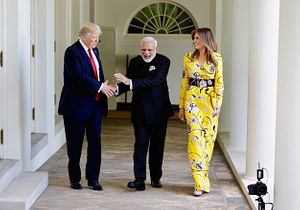It seems that the geopolitical question of the decade has become “how closely will India and the United States align?” For balance of power theorists, the appeal of U.S.-India engagement is obvious; it counter-balances China, and eliminates the need for the United States to rely on Pakistan while at the same time detaching India from Russia. Even for the relationship-averse Trump administration, the idea of extensive (if non-institutionalized) cooperation with India seems appealing, especially as Washington does not have substantial commercial conflicts with Delhi. However, it remains to be seen whether both countries can clear the legal and bureaucratic brush that continues to obstruct progress.
In service of this, both India and the United States seem committed to developing a tighter defense relationship. For example, Richard Rossow and Hemant Singh offer the beginnings of a vision of what U.S.-Indian cooperation can offer over the next decades. Rossow and Singh do not prioritize arms transfers within that vision, but it’s hardly difficult to imagine them playing a major part in building the alliance. Arms transfers necessarily increase interoperability and facilitate military engagement through training.
As Ankit Panda reported, in late July the United States upgraded India to a tier one strategic partner, granting greater access to an array of military technologies by relaxing requirements for individual licenses. And there have already been some successes. Still, on some level, it’s worth asking how heavily the United States should commit to developing its arms export relationship with India, given the state of the latter’s procurement process. As reported by The Diplomat, there are already problems with the acquisition of the P-8 Orion maritime patrol plane. Fundamentally, the Indian bureaucracy is not of one mind with respect to India’s geostrategic direction, and consequently the value of the relationship with the United States. This reluctance plays out in the bureaucratic battles that plague the Indian procurement process. On the U.S. side there are also, of course, the problems associated with India’s ongoing acquisition of Russian military equipment. A world in which both the United States and Russia export high-technology military equipment to India may not be possible under existing U.S. law.
At Lawfare, Oriano Skylar Mastro (an assistant professor at the Walsh School of Foreign Service at Georgetown University) resolves part of this problem by suggesting that Washington should try to supply India with military equipment by facilitating transfers from allies, rather than from the United States itself. This would resolve some interoperability concerns (insofar as any equipment used by a U.S. ally is likely more compatible than Russia or domestically-produced arms), but would not necessarily produce the level of military-to-military engagement and cooperation that the United States might want. Moreover, it’s difficult to imagine the Trump administration looking kindly on the idea of foregoing arms sales in deference to even the closest of U.S. allies.
Closer U.S.-India engagement seems to make sense, for very good reasons. The idea of the world’s two largest democracies in harmonious cooperation in the Indo-Pacific has a great deal of appeal, and not simply from a realist perspective. But democracies are, well, democratic, and foreign policy priorities are often limited not only by popular opinion, but also by the structures of democratic governance. It remains to be seen how well the governments of both India and the United States can navigate these issues.
The views expressed here are his personal views and do not necessarily reflect those of the Department of Defense, the U.S. Army, the Army War College, or any other department or agency of the U.S. government.

































